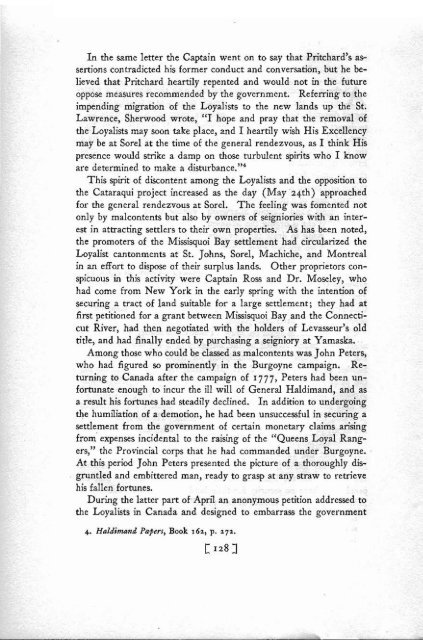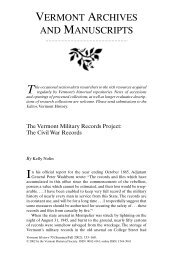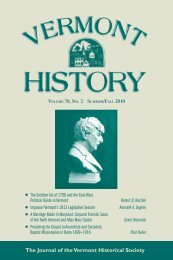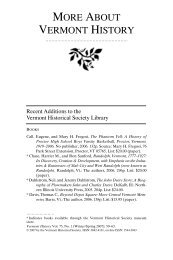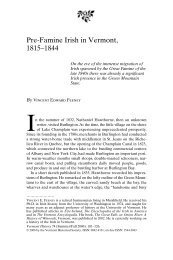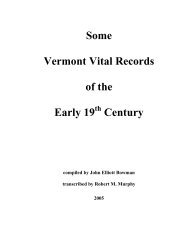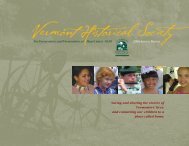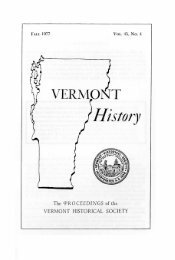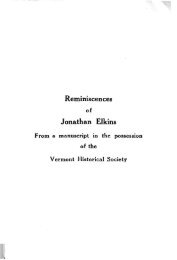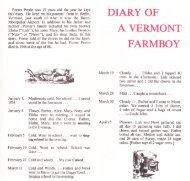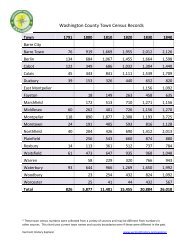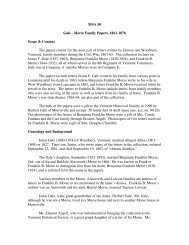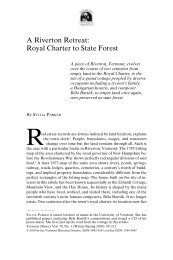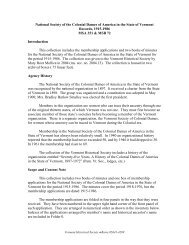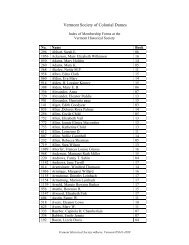The Missisquoi Loyalists - Vermont Historical Society
The Missisquoi Loyalists - Vermont Historical Society
The Missisquoi Loyalists - Vermont Historical Society
Create successful ePaper yourself
Turn your PDF publications into a flip-book with our unique Google optimized e-Paper software.
In the same letter the Captain went on to say that Pritchard's as-sertions<br />
contradicted his former conduct and conversation, but he believed<br />
that Pritchard heartily repented and would not in the future<br />
oppose measures recommended by the government. Referring to the<br />
impending migration of the <strong>Loyalists</strong> to the new lands up the St.<br />
Lawrence, Sherwood wrote, "I hope and pray that the removal of<br />
the <strong>Loyalists</strong> may soon take place, and I heartily wish His Excellency<br />
may be at Sorel at the time of the general rendezvous, as I think His<br />
presence would strike a damp on those turbulent spirits who I know<br />
are determined to make a disturbance."4<br />
This spirit of discontent among the <strong>Loyalists</strong> and the opposition to<br />
the Cataraqui project increased as the day (May 24-th) approached<br />
for the general rendezvous at Sorel. <strong>The</strong> feeling was fomented not<br />
only by malcontents but also by owners of seigniories with an interest<br />
in attracting settlers to their own properties. As has been noted,<br />
the promoters of the <strong>Missisquoi</strong> Bay settlement had circularized the<br />
Loyalist cantonments at St. Johns, Sorel, Machiche, and Montreal<br />
in an effort to dispose of their surplus lands. Other proprietors conspicuous<br />
in this activity were Captain Ross and Dr. Moseley, who<br />
had come from New York in the early spring with the intention of<br />
securing a tract of land suitable for a large settlement; they had at<br />
first petitioned for a grant between <strong>Missisquoi</strong> Bay and the Connecticut<br />
River, had then negotiated with the holders of Levasseur's old<br />
title, and had finally ended by purchasing a seigniory at Yamaska.<br />
Among those who could be classed as malcontents was John Peters,<br />
who had figured so prominently in the Burgoyne campaign. Returning<br />
to Canada after the campaign of 1777, Peters had been unfortunate<br />
enough to incur the ill will of General Haldimand, and as<br />
a result his fortunes had steadily declined. In addition to undergoing<br />
the humiliation of a demotion, he had been unsuccessful in securing a<br />
settlement from the government of certain monetary claims arising<br />
from" expenses incidental to the raising of the "Queens Loyal Rangers,"<br />
the Provincial corps that he had commanded under Burgoyne. "<br />
At this period John Peters presented the picture of a thoroughly dis-<br />
" gruntled and embittered man, ready to grasp at any straw to retrieve<br />
his fallen fortunes.<br />
During the latter part of April an anonymous petition addressed to<br />
the <strong>Loyalists</strong> in Canada and designed to embarrass the government<br />
4. Haldimand Papers, Book 162, p. 272.<br />
[128 ]
in its Cataraqui venture, was in circulation through the cantonments.<br />
. In, this document the <strong>Loyalists</strong> were called upon to assert their right,<br />
given under Lord North's proclamation, to settle in places of their<br />
own choice. "It was a little hard," the text ran, "to be obliged to<br />
take the King's lands under worse terms than could be obtained from<br />
the French seigniors, and if those hard terms were not accepted in a<br />
locality selected by General Haldimand, on the advice of some few<br />
interested and designing men, they were threatened with the loss of<br />
their provisions and other allowances from the government, by these<br />
same men." <strong>The</strong>n followed an appeal to the <strong>Loyalists</strong> to draw up a<br />
petition to the commander-in-chief incorporating their desires, and<br />
to forward it to "A.Z." at Quebec where it would be backed by the<br />
best gentlemen in the province. Provisions were to be promised and<br />
encouragement offered by M. de Lanaudiere and others. <strong>The</strong> petition<br />
was signed, "your Friend and one of you, A.Z."6<br />
A copy of this petition was obtained by stealth by Captain Pritchard<br />
and placed in the hands of Sherwood, who communicated its contents<br />
to headquarters. Naturally, the government was disturbed, and anxious<br />
to learn the identity of the authors of this seditious document.<br />
By a combination of stratagem and force, the Secret Service was<br />
shortly able to secure the original, which had been taken from Peters<br />
to Montreal by Moseley, and thence to St. Johm by one Allen.<br />
Referring to this affair, Captain Sherwood wrote on May 13th<br />
that Mr. Man had been given the "insidious original" which was in<br />
Colonel Peters' handwriting and spelling, although the diction did<br />
not appear to he entirely his. Sherwood continued, "It appears plain<br />
from Dr. Moseley & Pritchard that the seigniors in Canada are at<br />
the head of the scheme, indeed Moseley owned it and said it was for<br />
their interest to settle their own lands with the <strong>Loyalists</strong>, that the<br />
lands and terms offered by Government pointed out nothing but<br />
chains of slavery, that there was nothing but oppression in this Province,<br />
that the liberty of the press is taken from us and we need never<br />
expect to enjoy, in this province, the usual privileges of British subjects--in<br />
short, I am convinced that Moseley is a principal and one<br />
of the most active in this rebellious scheme, they have their Emissaries<br />
in every Cantonment. At St. Johns, Mr. Wehr, Alexr. Taylor and<br />
John Martin (low fellows) are foremost; at Machiche, Hobson and<br />
Case; at Duchene, Sergeant Ward, Peter Mills and some others;<br />
5- Haldimand Papers, Book 178, p. 289.<br />
[ 129 ]
the then Governor, and Com11'UM'lder in Chief, for a tract of land<br />
East of Missisqude Bay, for Each of us there to receive his Portion of<br />
land, allowed by Government for services but not Receiving an Answer<br />
to our Petition untililate in the Winter Fallowing, and we being<br />
Desireous, to Git in some way of Liveing again, and to retrieve a<br />
little our Losses (by Cultivation) which we suffered During the unhappy<br />
troubles in North America which losses were very considerable<br />
with some of us, and very sorely Feel'd by Every One of us and Your<br />
humble Petitioners would not be under necessity of troubleing you,<br />
had they at present what they have lost, and were opleged to leave in<br />
the hands of the Enemy, since they from the beginning of the late<br />
troubles in America, adheared to British Government, and joined<br />
the British forces in the Year Il7?, but since, as above mentioned,<br />
were desireous to git into some way of liveing, we bought a tract of<br />
land of Mr. Robertson of St. Johns, and some of us settled thereon<br />
before Ever his Excellence Fridrick Haldemand, Esqr., the late Commander<br />
in Chief had Given Orders or Pointed out Places for the setling<br />
of <strong>Loyalists</strong>, but so it was, that since some of us setled at the Bay<br />
of Missisquie, and Otheres could not move when the orderes came<br />
out for to setle at the apointed Places by Reasson of Sickness, and<br />
Othere Hindrance in their Families, and all of us hopeing that we<br />
should Yit Git the land in the Parts we Petitioned for, but so it wos,<br />
since we did not Go, to the Place or Places pointed at, we were<br />
struck off the Provisions list, part of us since the 24th of May last,<br />
the Otheres at Different times After, but all of us since the 24th.<br />
Octr. last. Wherefor.e we most Humbly beg of your Excellence in<br />
your Clemency, and love to Your Fellow Men, who have sorely suffered<br />
During the late Rebellion both in body and Estate, and Ordere<br />
that the Provision and Othere Donations Allowed to <strong>Loyalists</strong>, by<br />
Government, Should be given to us from the time that Everyone of<br />
us, and Families were struck off the Provision list. And we humbly<br />
beg your Excellence will Please to Cond.escend, to favor us with an<br />
Answer, Withere we Shall have Provision, Or no, for it is our Opinion<br />
that all <strong>Loyalists</strong>, Settling in the Province of Quebec, are Allowed<br />
Provision wether on Kings Land or not, if within the Province line,<br />
Moreover, we humbly beg to inform your Excellence, that We little<br />
Expected, Nithere do we think, that it is Governments intention, or<br />
any Order, from our Most Gracious King, and his Perliment, that all<br />
such of his true and faithful Subjects as Your Petitioners, Should be<br />
struc off of all bennefits from Government, as Donations of Provs,<br />
[ 13 2 ]
tJfld Othere Things, alowed by Government. Except such and only<br />
such, who setle in them Perticular Places, which PerJwpes through<br />
the Indication of S.elfe interested Gentlemen, has been put into the<br />
head of the late Commander in Chief, to Pointe out for Seeling of the<br />
<strong>Loyalists</strong> in the Province of Quebec, Furthere more, we doubt, Yea,<br />
we are most sure, that there is some underhand Dealings with the<br />
kings Provs, by them who have the posts for Giveing orders for the<br />
<strong>Loyalists</strong> Prow. as for imtance at St. Johm &c., For we sent a Petition<br />
to Your Excellence Decr. last and Never hear'd thereof, Wherefore<br />
we beg Your Excellence will Please to Condescend to Derect<br />
Your A mwer to Chn. Wehr Lieut. Royl. Yorkers at Missisquie Bay,<br />
and to the care of Mr. Alexr. Taylor at St. Johns, and if Your Excellence<br />
will most Graciously Please to Grant us our Petition, Your<br />
Petitioners as in duty bound Shall Ever Pray,<br />
sd. Christian Wehr<br />
Conrade Best<br />
Christian Haver<br />
John Ruiter<br />
Adam Deal<br />
John Cole<br />
Ludwig Streit<br />
George Feller<br />
J osarrzind Drow<br />
Lodwik Stnt, Junr.<br />
Jacob Thomas<br />
Philip Ruiter<br />
John Van Vorst<br />
James Henderson<br />
Alexr. Taylor<br />
Missisquie Bay, Feb. 7th, 1785.1<br />
<strong>The</strong>se signatures show a marked change in the composition of the<br />
<strong>Missisquoi</strong> Bay group. Of the original eleven, only four remained,<br />
namely, Christian Wehr, Conrad Best, John Ruiter, and Alexander<br />
Taylor. George Feller and James Henderson had been named in a<br />
previous list (Wehr's letter of April 27th), while Philip Ruiter was<br />
the son of Captain Henry Ruiter, and Christian Haver the father-inlaw<br />
of Lieutenant Wehr. <strong>The</strong> remainder, probably those who<br />
7. <strong>Missisquoi</strong> County <strong>Historical</strong> <strong>Society</strong>, 3rd Report, p. 101.<br />
[ 133 ]
«could not move when the orderes came out for to setle at the apointed<br />
Places by Reasson of Sickness, and Othere Hindrance in their Families,"<br />
are mentioned for the first time. <strong>The</strong> marked preponderance<br />
of Teutonic names is significant, and accounted for by the composition<br />
of the population on the Champlain frontier of New York,<br />
whence most of these settlers came.<br />
It is evident from this document and from some of the preceding<br />
correspondence as well, that the <strong>Missisquoi</strong> <strong>Loyalists</strong> were unable to<br />
conceive that Haldimand's opposition to their settlement was based<br />
on grounds of broad public policy, and could account for it only on<br />
the theory that it was inspired by some self-interested motive, on the<br />
part either of the commander-in-chief or of his advisers. In fairness<br />
to this point of view it may be said that Haldimand had been instructed<br />
to victual the <strong>Loyalists</strong> until May I, 1786,8 and that the interpretation<br />
of this order, restricting such victualing to settlers on<br />
Crown lands, seems to have been his own. Lieutenant Wehr's petition<br />
was transmitted to the Ministry by Lieutenant Governor Hamilton,<br />
together with remarks concerning Haldimand's interpretation as<br />
above stated,9 and on August 22, 1785, Brigadier General Hope,<br />
who had succeeded Hamilton, was advised by Sydney that <strong>Loyalists</strong> on<br />
private lands were to have an equal share of the royal bounty with<br />
those on Crown lands. Io Furthermore, the <strong>Missisquoi</strong> settlers were<br />
shortly to experience more trouble, and from a man who had been<br />
high in the councils of General Haldimand.<br />
It will be recalled that the title to the seigniory of St. Armand had<br />
descended to William McKenzie, Benjamin Price, James Moore,<br />
and George Fulton, or to their beneficiaries. On April 4, 1786,<br />
James Moore purchased the shares that had belonged to William Mc<br />
Kenzie and Benjamin Price; on the July 4th following he sold his<br />
three-quarter interest to Thomas Dunn, who on February I I, 1787,<br />
purchased the remaining quarter from the legatees of George Fulton.<br />
11 Thomas Dunn, on May 12, 1789, was recorded as the proprietor<br />
of the .fief and seigniory of St. Armand, a title that remained<br />
in the possession of his heirs as late as December I, 1860. 12<br />
<strong>The</strong> Han. Thomas Dunn was a prominent citizen of C2uebec.<br />
8. Canada Archives, 1885. p. 356.<br />
9. Ibid., 1890, State Pa.pers, p. 149.<br />
10. I bid., p. 162.<br />
II. Ibid., 1885, p. 71.<br />
1:2. IntVentaire des Concessions en Fief et Seigneuries, P. G. Roy.<br />
[ 134- J
Born in Durham, England, in 173 I, he had come to Canada shortly<br />
after the conquest, where he had been successful in mercantile affairs.<br />
Later he became a judge of the court of Queen's Bench and was appointed<br />
by Carleton to the Legislative Council in 1775. Under<br />
Haldimand he had filled various offices, including that of Paymaster<br />
General of the Marine Department. In 1805, Thomas Dunn, as<br />
senior Executive Councillor, took office as acting Lieutenant Governor<br />
on the departure of Milnes.<br />
To a man of Dunn's standing and connections it was not a difficult<br />
matter to make good his ownership and possession against the<br />
people who had settled "them Indian lands" merely on the strength<br />
of James Robertson's lease. In consequence, the <strong>Missisquoi</strong> settlers<br />
were forced to repurchase their lands from the new owner, Captain<br />
Henry Ruiter acting as resident agent for Mr. Dunn.<br />
<strong>The</strong> original of one of the deeds by which the land was reconveyed<br />
to the early settlers is still preserved at <strong>Missisquoi</strong> Bay. It is a printed<br />
form, indicating the extent of Mr. Dunn's holdings. This particular<br />
document was dated June 8,1792, in the house of John Ruiter, Esq.,<br />
on <strong>Missisquoi</strong> in Lake Champlain, between the Hon. Thomas Dunn<br />
of Quebec, proprietor of the fief and seigniory of St. Armand, and<br />
Charles Miller, residing on the said seigniory. In consideration of<br />
the payment of twenty pounds, Dunn conveyed to Miller the lot<br />
numbered 2 I on a plan drawn by Caleb Henderson, surveyor, containing<br />
some two hundred and ten acres, more or less; the conveyance<br />
was made subject to a quit rent of two shillings annually forever, in<br />
return for which the proprietor waived all other rights and dues<br />
usually associated with the seigniorial tenure. <strong>The</strong> witnesses were<br />
Patrick Conway and Henry Ruiter. <strong>The</strong>re was also an addendum<br />
dated August 3 I, 1796, acknowledging the receipt of ten shillings<br />
lawful money in full payment for five acres of land contained in the<br />
aforesaid lot, more than the two hundred and ten acres mentioned in<br />
the foregoing deed. From this it will be seen that Dunn sold his land<br />
for two shillings per acre.<br />
<strong>The</strong> above-mentioned Charles Miller was the son of the Peter<br />
Miller who had joined Carleton at Crown Point in 1776, had then<br />
served under Peters and MacKay in 177 7, and thereafter with Captain<br />
Leake. In the fall of 1784- he had come to Misslsquoi Bay with<br />
his son-in-law, where they had purchased adjoining lots from the<br />
proprietors under the Indian lease. Peter Miller, in March 1792,<br />
had deeded the property to his son Charles, who had thus been under<br />
[ 135 J
His Excellency would do all in his power to prevent misunderstandings<br />
between the frontier settlers. 14<br />
A few days later Ira Allen renewed his complaint of further outrages<br />
instigated by the "diabolical machinations of some individuals<br />
residing at St. Johns," and enclosing additional depositions. 1G John<br />
Johnson tf.Stified that the Indians had come to Swanton with an interpreter<br />
and had warned the inhabitants to move or they would burn<br />
their houses and kill the cattle. A settler replying that the land belonged<br />
to Colonel Allen, the Indian chief drew his knife and threatened<br />
to scalp Colonel Allen; whereupon the Abenakis had helped<br />
themselves to one sheep and several canoe-loads of corn and beans in<br />
lieu of rent. According to Jonathan Butterfield, James Hunter of<br />
St. Johns had sworn in his presence that if Colonel Allen came to that<br />
place, that he would put a ball in his head or place him in irons under<br />
guard. Thomas Butterfield averred that he had heard the same<br />
James Hunter swear that he would send the Indians to burn all the<br />
houses, kill the cattle, and drive Colonel Allen's people from the<br />
River.<br />
To this second letter Mathews replied on October II, 1784, that<br />
orders had" been given to investigate the causes of the dispute on the<br />
spot, and at the same time he wrote to Lieutenant Colonel Campbell<br />
at St. Johns, desiring him to examine into the disputes between the<br />
St. Francis Indians and Ira Allen's settlers. 16 Colonel Campbell's<br />
interposition proving effective, all was quiet and serene at Swanton<br />
for several years.<br />
However, in 1788, the Indians gave some further trouble and Ira<br />
Allen addressed his complaints to Sir Guy Carleton, who had returned<br />
to Canada as Governor GeneraJ.l 7 Colonel Campbell was again<br />
called upon to intervene, through an order from Sir John Johnsen,<br />
Superintendent General of Indian Affairs. In this instance, the two<br />
complainants, John Waggoner and William Tichout, with their interpreter,<br />
John Hilliker, declined a personal meeting with the Indians<br />
concerned, for which Colonel Campbell presumed to think unfavorably<br />
of their complaint. As a matter of fact, all three of these men,<br />
Waggoner, Tichout, and Hilliker, were <strong>Loyalists</strong> and ex-Loyal<br />
Rangers who had settled in <strong>Vermont</strong>.<br />
14. Canada Archi'lJes, 1886, p. 451.<br />
15. Haldimand Papers, Book] 75, p. 288.<br />
16. Canada Archi'lJu, ]886, p. 453.<br />
]7. <strong>Vermont</strong> <strong>Historical</strong> Magazine, Hemenway, Vol. 4, PP' 998-1000.<br />
[ 137 ]
Hi.tory of Canada, William Kingsford.<br />
An Address, James Davie Butler.<br />
<strong>Vermont</strong> <strong>Historical</strong> <strong>Society</strong>, Proceedings for z870'<br />
History .of VertfWnt, Wa.lter H. Crockett.<br />
<strong>Vermont</strong> <strong>Historical</strong> Gautteer, A. M. Hemenway.<br />
Gazetteer 0/ VeNr/ont, Zadock Thompson.<br />
American <strong>Loyalists</strong> in the Eastern Seigniories and Townships of the Province<br />
0/ Quebec, W. H. Siebert.<br />
Contributions to the Hiuory 0/ the Eastern Townships, Cyrus Thomas.<br />
History of the Eastern Township., C. M. Day.<br />
<strong>Missisquoi</strong> County <strong>Historical</strong> <strong>Society</strong>, Reports.<br />
Natural and Poutical History of <strong>Vermont</strong>, Ira Allen.<br />
C139 ]
I<br />
POSTSCRIPT<br />
N the tedious process of unraveling the tangled skein of the lives of<br />
the New England <strong>Loyalists</strong> who had every reason to believe that<br />
the British government represented a stahle force and the American<br />
Revolution an abortive attempt to challenge it, the historian must<br />
not lose sight of the moves and countermoves of the principal leaders<br />
who were making history; but I confess to an abiding interest in the<br />
<strong>Loyalists</strong>' ambitions and destiny as a dramatic and human story. It<br />
seems to me that Mr. Lampee has sketched with the impersonal touch<br />
of the historian not only the forces that functioned in creating the<br />
<strong>Missisquoi</strong> <strong>Loyalists</strong>, but he has, also, caught as an undertone the<br />
human values. Certainly, the men, and indirectly the women, who<br />
came under the scheme of his research in his brief but competent study<br />
reflect the old motives that actuated them long ago and are recovered<br />
for us from the deepening shadows of a vanished century.<br />
One of these days, of course, the novelist and playwright, possibly<br />
the poet, will turn to such themes as lie in studies like this by Mr.<br />
Lampee for literary are that holds high dramatic and story values.<br />
<strong>The</strong> assumption of a century ago and less that the <strong>Loyalists</strong> were a<br />
benighted class and outright traitors has faded; and the true picture<br />
of them as men and women, sacrificing homes and land9 and old associations,<br />
suffering privation and distress of varying kinds, and in<br />
many cases dying for a cause in which they believed, is beginning to<br />
focus dimly in the popular mind.<br />
Mr. Lampee belongs to that interesting class of American business<br />
men who turn from business to some phase of historical research as<br />
an avocation and then find they are entering a vocation. He is a<br />
graduate of Dartmouth College where his major courses were taken<br />
in the Department of History. His interest in the <strong>Missisquoi</strong> <strong>Loyalists</strong><br />
Was primarily genealogical, as one of his ancestors was a member of<br />
that stubborn group who showed such "indecent perseverance" in<br />
settling at <strong>Missisquoi</strong> Bay, and the farm that he cleared is still in the<br />
family. That early interest grew into a definite research project, and<br />
<strong>The</strong> Missisqw:>i <strong>Loyalists</strong> is the result. Correspondence intended for<br />
Mr. Lampee should be addressed as follow&--Mr. Thomas C.<br />
Lampec:, 1246 Commonwealth Avenue, Allston, Massachusetts.<br />
[14° ]<br />
A.W.P.


